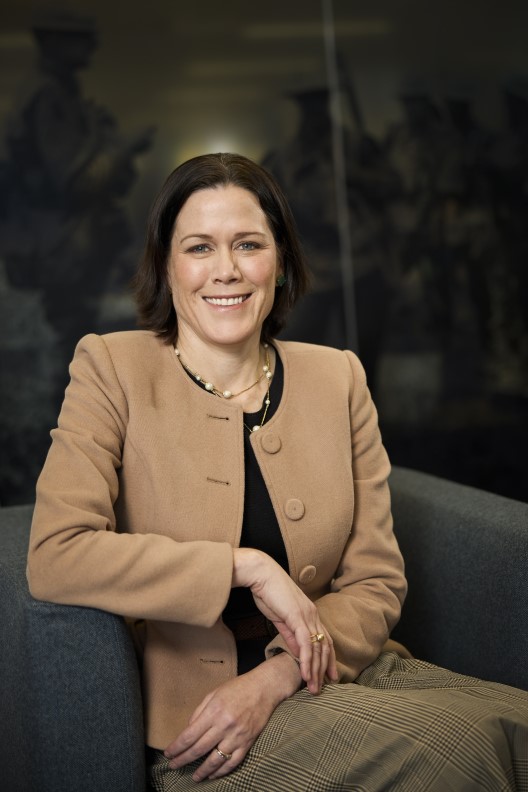From the Department

Alison Frame
Secretary, Department of Veterans’ Affairs
My contribution to this edition of Vetaffairs provides a great opportunity to share some information on how DVA is working to improve and increase innovation and continuous improvement across all our services.
We are focussed on streamlining and improving the way we do business so we are better able to serve you. For example, we have implemented some improvements to MyService which now allow you to view up-to-date information and provide all documents for all claims, whether submitted through MyService or other channels, reducing the need for you to send that information by email or post.
In July, we rolled out a new online training program targeted at GPs and other primary care providers to give them a better understanding of veteran health issues and the services available through DVA. So far, two webinars have also been conducted with a high level of interest and there have been 2,300 visits to the training website. More training modules will be made available over the coming months.
In our Rehabilitation Program, we have made it simpler for providers to deliver services, giving them more autonomy so they can make decisions within certain guidelines, delivering support faster to those clients who need it. DVA has also updated and simplified the documents that rehabilitation providers use, enhanced our capabilities to monitor their performance, and made it easier for you to tell us about your experience of the program.
One example of where we are seeking to work side by side with veterans and advocates is through a new claims program in Western Australia where experienced DVA claims processing staff work alongside ex-service organisation (ESO) advocates to support veterans to lodge their claims. The program initially involved two local ex-service organisations, with another joining in July.
Programs like this have the potential to smooth the claims process. Veterans who use this service can be assured that when they submit a claim their documentation is in order, which prevents unnecessary delays and delivers a faster outcome, minimising stress and frustration for clients. To date, our staff have supported veterans to lodge more than 250 claims and provided on-site support for advocates. The feedback so far as been extremely positive and we are aiming to roll this program out nationally.
Initiatives like this have the potential to make the claims process easier for veterans. They reduce unnecessary delays and minimise stress and frustration for clients. In the future, we hope to expand such initiatives: getting our staff on the ground, sitting alongside veterans who require additional support so they can hear their needs directly and work towards the shared goal of getting them the support they are entitled to.
Another recent innovation we are pleased to see commence are the new, community-based PTSD Treatment and Recovery and Referral Pathways programs that have begun in Tasmania. Veterans can now be referred directly to Open Arms through the state’s Centralised Intake and Referral Service, which they can access themselves or through a general practitioner.
One of the ways we are ensuring DVA services and support are fit for purpose is by building them in collaboration with the veteran community. We are always seeking different ways to tap into the diverse and unique experiences of the veteran community to inform our programs and policies.
In recent months, we’ve held two online Community Consultation Town Hall events: the first on Grants and Hubs, the second on IT Innovation and Cyber Security. This is the first time DVA has held events like this, where veterans have engaged directly with senior members of DVA staff and provided direct feedback on how we could improve our delivery and services. These events are part of our commitment to open, genuine and meaningful engagement, and we are looking forward to holding more in the future. Thank you to all those who participated.
DVA is on a journey of improvement and our next steps will be guided by the Government’s response to the final report of the Royal Commission into Defence and Veteran Suicide. The Department has already undertaken significant preparatory work to ensure that we are well placed to rapidly respond to its findings and the Government’s response.
In closing, I wish to offer my sincere gratitude to outgoing Assistant Minister for Veterans’ Affairs Matt Thistlethwaite for his support and steadfast commitment to the veteran community during a time of transformation for the Department. In particular, the Assistant Minister’s support for Open Arms and innovation within the DVA has been greatly appreciated.
We also welcome Luke Gosling MP as Special Envoy for Defence, Veterans’ Affairs and Northern Australia. Mr Gosling is a veteran of peacekeeping in Timor-Leste and will be helping us with the upcoming program of events commemorating the 25th anniversary of the beginning of Australian service in that country.
DVA was established to fulfil the nation’s duty to support the wellbeing of Australia’s veterans and families. It’s a great privilege to lead the Department in this important work and at this pivotal time. As we continue to innovate and improve our services, I look forward to continuing to work with members of the veteran community to ensure we are successful in our mission.
